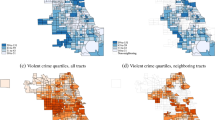Abstract.
The objective of this article is to analyze wage inequality among the 10 largest metropolitan regions in Brazil in the 1990s. We assess the extent to which worker characteristics (education, age, gender, race, position in the family) and job characteristics (occupational position, sector, experience) can explain wage inequality. The analysis is made both with regional-nominal and with regional-real wage data. In the second case regional price indexes are used to control for differences in cost of living among regions. Wage differentials in Brazil were slightly lowered when control variables were introduced, but the leftover inequality remained high. The results indicate that cost of living levels do have a role in explaining wage inequality in Brazil, but even after controlling for this factor, the remaining regional differentials are still important.
Similar content being viewed by others
Author information
Authors and Affiliations
Additional information
Received: 18 August 2000 / Accepted: 20 June 2001
Rights and permissions
About this article
Cite this article
Azzoni, C., Servo, L. Education, cost of living and regional wage inequality in Brazil. Papers Reg Sci 81, 157–175 (2002). https://doi.org/10.1007/s101100200105
Published:
Issue Date:
DOI: https://doi.org/10.1007/s101100200105




